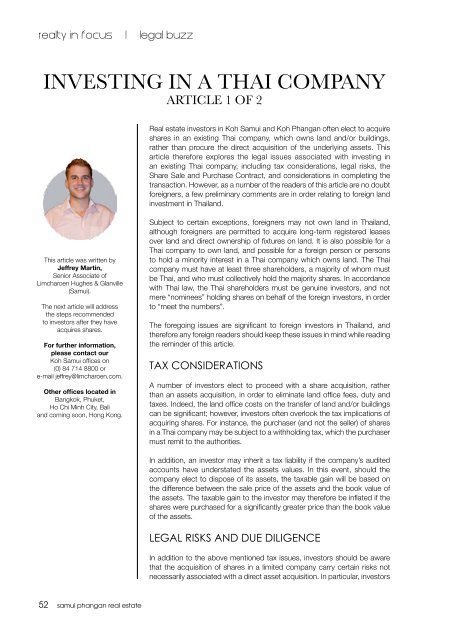You also want an ePaper? Increase the reach of your titles
YUMPU automatically turns print PDFs into web optimized ePapers that Google loves.
ealty in focus l legal buzz<br />
INVESTING IN A THAI COMPANY<br />
ARTICLE 1 OF 2<br />
This article was written by<br />
Jeffrey Martin,<br />
Senior Associate of<br />
Limcharoen Hughes & Glanville<br />
(<strong>Samui</strong>).<br />
The next article will address<br />
the steps recommended<br />
to investors after they have<br />
acquires shares.<br />
For further information,<br />
please contact our<br />
Koh <strong>Samui</strong> offices on<br />
(0) 84 714 8800 or<br />
e-mail jeffrey@limcharoen.com.<br />
Other offices located in<br />
Bangkok, Phuket,<br />
Ho Chi Minh City, Bali<br />
and coming soon, Hong Kong.<br />
52 samui phangan real estate<br />
<strong>Real</strong> estate investors in Koh <strong>Samui</strong> and Koh <strong>Phangan</strong> often elect to acquire<br />
shares in an existing Thai company, which owns land and/or buildings,<br />
rather than procure the direct acquisition of the underlying assets. This<br />
article therefore explores the legal issues associated with investing in<br />
an existing Thai company, including tax considerations, legal risks, the<br />
Share Sale and Purchase Contract, and considerations in completing the<br />
transaction. However, as a number of the readers of this article are no doubt<br />
foreigners, a few preliminary comments are in order relating to foreign land<br />
investment in Thailand.<br />
Subject to certain exceptions, foreigners may not own land in Thailand,<br />
although foreigners are permitted to acquire long-term registered leases<br />
over land and direct ownership of fixtures on land. It is also possible for a<br />
Thai company to own land, and possible for a foreign person or persons<br />
to hold a minority interest in a Thai company which owns land. The Thai<br />
company must have at least three shareholders, a majority of whom must<br />
be Thai, and who must collectively hold the majority shares. In accordance<br />
with Thai law, the Thai shareholders must be genuine investors, and not<br />
mere “nominees” holding shares on behalf of the foreign investors, in order<br />
to “meet the numbers”.<br />
The foregoing issues are significant to foreign investors in Thailand, and<br />
therefore any foreign readers should keep these issues in mind while reading<br />
the reminder of this article.<br />
TAx CONSIDERATIONS<br />
A number of investors elect to proceed with a share acquisition, rather<br />
than an assets acquisition, in order to eliminate land office fees, duty and<br />
taxes. Indeed, the land office costs on the transfer of land and/or buildings<br />
can be significant; however, investors often overlook the tax implications of<br />
acquiring shares. For instance, the purchaser (and not the seller) of shares<br />
in a Thai company may be subject to a withholding tax, which the purchaser<br />
must remit to the authorities.<br />
In addition, an investor may inherit a tax liability if the company’s audited<br />
accounts have understated the assets values. In this event, should the<br />
company elect to dispose of its assets, the taxable gain will be based on<br />
the difference between the sale price of the assets and the book value of<br />
the assets. The taxable gain to the investor may therefore be inflated if the<br />
shares were purchased for a significantly greater price than the book value<br />
of the assets.<br />
LEGAL RISKS AND DUE DILIGENCE<br />
In addition to the above mentioned tax issues, investors should be aware<br />
that the acquisition of shares in a limited company carry certain risks not<br />
necessarily associated with a direct asset acquisition. In particular, investors





